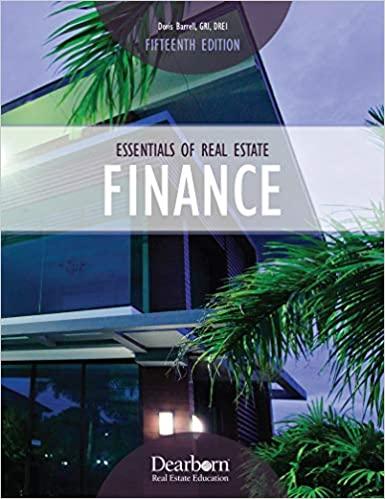Question
Problem 7-14 Consider the data contained in the table below, which lists 30 monthly excess returns to two different actively managed stock portfolios (A and
Problem 7-14
Consider the data contained in the table below, which lists 30 monthly excess returns to two different actively managed stock portfolios (A and B) and three different common risk factors (1, 2, and 3). (Note: You may find it useful to use a computer spreadsheet program such as Microsoft Excel to calculate your answers.)
| Period | Portfolio A | Portfolio B | Factor 1 | Factor 2 | Factor 3 | ||||||
| 1 | 1.06 | % | 0.00 | % | 0.01 | % | -0.97 | % | -1.60 | % | |
| 2 | 7.50 | 6.65 | 6.89 | 0.25 | -1.13 | ||||||
| 3 | 4.95 | 5.99 | 4.71 | -1.49 | 1.98 | ||||||
| 4 | 1.17 | 0.45 | 0.57 | 0.38 | 0.21 | ||||||
| 5 | -1.93 | -1.64 | -2.88 | -3.72 | 4.26 | ||||||
| 6 | 4.17 | 2.29 | 2.78 | -3.42 | -1.49 | ||||||
| 7 | -0.67 | -2.37 | -2.69 | -4.41 | -1.75 | ||||||
| 8 | -15.51 | -15.49 | -16.18 | -5.91 | 5.69 | ||||||
| 9 | 6.14 | 3.97 | 5.86 | 0.01 | -3.79 | ||||||
| 10 | 7.62 | 6.71 | 7.16 | -3.36 | -2.80 | ||||||
| 11 | 7.75 | 5.45 | 5.80 | 1.43 | -3.70 | ||||||
| 12 | 9.70 | 4.94 | 5.89 | -0.38 | -4.95 | ||||||
| 13 | 5.16 | 2.75 | 3.43 | 1.07 | -6.22 | ||||||
| 14 | -3.26 | -0.57 | -4.10 | -5.49 | 1.61 | ||||||
| 15 | 5.36 | 2.55 | 3.36 | -3.73 | -2.97 | ||||||
| 16 | 2.45 | 7.22 | 4.43 | 2.95 | 2.84 | ||||||
| 17 | -2.83 | 0.13 | -2.46 | 3.41 | 2.99 | ||||||
| 18 | 6.53 | 3.64 | 4.74 | 3.52 | -4.36 | ||||||
| 19 | -3.47 | -0.55 | -3.53 | 2.08 | 0.64 | ||||||
| 20 | -1.34 | -4.16 | -1.35 | -1.13 | -1.24 | ||||||
| 21 | -1.41 | 0.06 | -2.78 | 3.27 | -3.24 | ||||||
| 22 | 6.10 | 5.33 | 5.90 | -6.54 | -3.17 | ||||||
| 23 | 2.14 | 2.22 | 3.25 | 7.80 | -8.00 | ||||||
| 24 | 7.25 | 6.99 | 7.78 | 6.91 | -9.12 | ||||||
| 25 | -4.90 | -2.74 | -4.46 | 4.09 | -0.23 | ||||||
| 26 | 1.02 | -2.13 | 2.47 | 21.49 | -12.10 | ||||||
| 27 | 9.07 | 5.23 | 5.03 | -16.70 | 7.80 | ||||||
| 28 | -4.24 | -3.01 | -6.22 | -7.54 | 8.53 | ||||||
| 29 | -3.44 | -0.59 | -4.22 | -5.83 | 5.34 | ||||||
| 30 | 3.79 | 1.74 | 4.65 | 13.31 | -8.75 | ||||||
- Using regression analysis, calculate the factor betas of each stock associated with each of the common risk factors. Which of these coefficients are statistically significant at 5% level of significance? Fill in the table below. Use a minus sign to enter negative values, if any. Do not round intermediate calculations. Round your answers for factor betas to three decimal places and answers for t-statistics to two decimal places.
bi t-statistic Significance Regression for Portfolio A onstant (significant/not significant) Factor 1 (significant/not significant) Factor 2 (significant/not significant) Factor 3 (significant/not significant) Regression for Portfolio B onstant (significant/not significant) Factor 1 (significant/not significant) Factor 2 (significant/not significant) Factor 3 (significant/not significant) -
How well does the factor model explain the variation in portfolio returns? On what basis can you make an evaluation of this nature?
The factor models explain (well/bad) as the (adjusted R2/ multiple R/ intercept values in both regressions are (high enough/not high enough/low enough/not low enough).
-
Suppose you are now told that the three factors used in the models represent the risk exposures in the Fama-French characteristic-based model (i.e., excess market, SMB, and HML). Based on your regression results, which one of these factors is the most likely to be the market factor? Explain why.
(Factor 1/Factor 2/ Factor 3) is the most likely candidate for the market factor, because it has a (large, significant, and positive/ large, significant, and negative/ small, not significant, and negative/ small, not significant, and positive) effect on both portfolios.
-
Suppose it is further revealed that Factor 3 is the HML factor. Which of the two portfolios is most likely to be a growth-oriented fund and which is a value-oriented fund? Explain why.
(Portfolio A/ Portfolio B) is the more likely candidate for the value-oriented portfolio as it has a (positive/negative) loading on this factor.
(Portfolio A/Portfolio B) is the more likely candidate for the growth-oriented portfolio as it has a (positive/negative) loading on this factor.
Step by Step Solution
There are 3 Steps involved in it
Step: 1

Get Instant Access to Expert-Tailored Solutions
See step-by-step solutions with expert insights and AI powered tools for academic success
Step: 2

Step: 3

Ace Your Homework with AI
Get the answers you need in no time with our AI-driven, step-by-step assistance
Get Started


